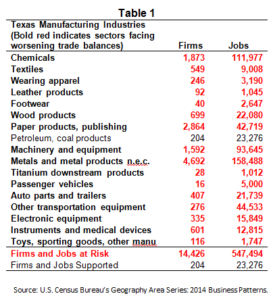For Immediate Release
Contact: Bob Cash, (512) 912-6630, bobcash@citizenstrade.org
Study Projects Worsening Trade Balances for 25 Manufacturing and Agricultural Sectors in Texas under Trans-Pacific Trade Deal
New Government Report Projects the Trans-Pacific Partnership (TPP) Would Hurt Machinery, Chemicals, and Wheat Sectors, Among Others
San Antonio, Texas – An official U.S. International Trade Commission (ITC) study on the economic effects of the TPP reveals that 36 of 55 economic sectors in the United States, many of which form the backbone of the Texas state economy, would experience worsening trade balances were the TPP implemented.
The 17 manufacturing sectors examined in the report support more than 570,000 Texas jobs. The ITC study found that 16 of 17 manufacturing sectors are projected to see declining trade balances under the TPP, meaning that 547,494 Texas manufacturing jobs are in at-risk categories under the TPP while only 23,276 Texans are employed in the processing of petroleum and coal products, which is the only manufacturing sector that would see an improved trade balance. (See Table 1 below.)
The report projected modest gains in 12 of 21 agricultural sectors. Losing agricultural sector in Texas include wheat, coarse grains and soybeans. The ITC’s projected increase in the U.S. trade deficit in manufacturing, and worsening trade balances in the natural resources and services sectors, are five times larger than the projected gains in the agricultural sector, where some commodities gain and some lose.
“This report highlights how damaging the TPP would be for San Antonio’s jobs and wages, including those jobs that involve trade with Mexico,” said Viola Casares, co-founder of Fuerza Unida. “Given that the ITC has historically overestimated the benefits and downplayed the costs of trade agreements, including NAFTA, the fact that they’re saying so many Texas industries are at risk under the TPP is a real cause for concern.”
The TPP was signed in February, but cannot take effect without Congress’ approval. The White House wants a vote as soon as possible. Some members of Congress were awaiting the ITC report before taking a position. Local Rep. Joaquin Castro (D-Texas) is one of few Democrats in the House of Representatives not opposed to the TPP, which all three remaining presidential candidates oppose.
The ITC report’s unexpectedly grim findings include estimates that the pact would provide almost no gains for U.S. economic growth (only 0.15 percent by 2032) while reducing employment in manufacturing, shrinking the U.S. service sector trade surplus and increasing the overall U.S. trade deficit by $21.7 billion. Because the agency employs a model that incorporates unrealistic assumptions, such as constant full employment and no currency manipulation, past projections have systematically overstated the benefits of trade pacts relative to their outcomes.
With respect to agriculture, the ITC uses tariff cuts as proxies to estimate gains in U.S. market access. But whether tariff cuts translate into real export gains for Texas farmers relies on other factors not considered in the study, such as exchange rate manipulation by trade partners, rules of origin, fuel costs and lower farm gate prices from agricultural competitors. These factors could result in an outcome where additional market access on paper (tariff cuts) leads to little-to-no actual increase in Texas agricultural sales to TPP countries. Indeed, some of the TPP countries have records of significant currency devaluations, which can wipe out tariff cut benefits for our exports, yet the TPP has no provisions to counter this.
The ITC projected much more optimistic outcomes for the most recent previous U.S. trade agreement on which TPP was modeled, the 2012 U.S-Korea Free Trade Agreement (FTA). The ITC said that pact would result in a narrowing of the U.S. trade deficit with Korea. Instead, our Korea trade deficit in the top 10 products that Texas exports to Korea – including everything from food products to transportation equipment – grew 49 percent in the pact’s first four years as the overall U.S. goods trade deficit with Korea nearly doubled. According to the administration’s trade-jobs ratio, counting both exports and imports, that equates to the loss of over 102,000 U.S. jobs in four years of the FTA.
In Texas alone, more than 174,764 jobs have been certified as lost to offshoring or imports since the North American Free Trade Agreement (NAFTA) under just one narrow U.S. government program called Trade Adjustment Assistance (TAA). The TAA numbers significantly undercount trade-related job loss because the program only covers a subset of jobs lost to trade and only counts job losses that are voluntarily reported to the agency.
“To his credit, our congressman, Joaquin Castro, voted against the undemocratic Fast Track process that will be used to try and force passage of the TPP. Currently he says he is undecided as to how he will vote on TPP itself,” said Casares. “Given the new information in the ITC report, we hope he will take a stand and lead the charge against this agreement that, like NAFTA, will be a job killer in San Antonio and generate labor and climate injustices in our sister communities throughout Mexico and the world.”
Table 1 below shows the number of Texas jobs in manufacturing that the TPP would either support or put at risk.

